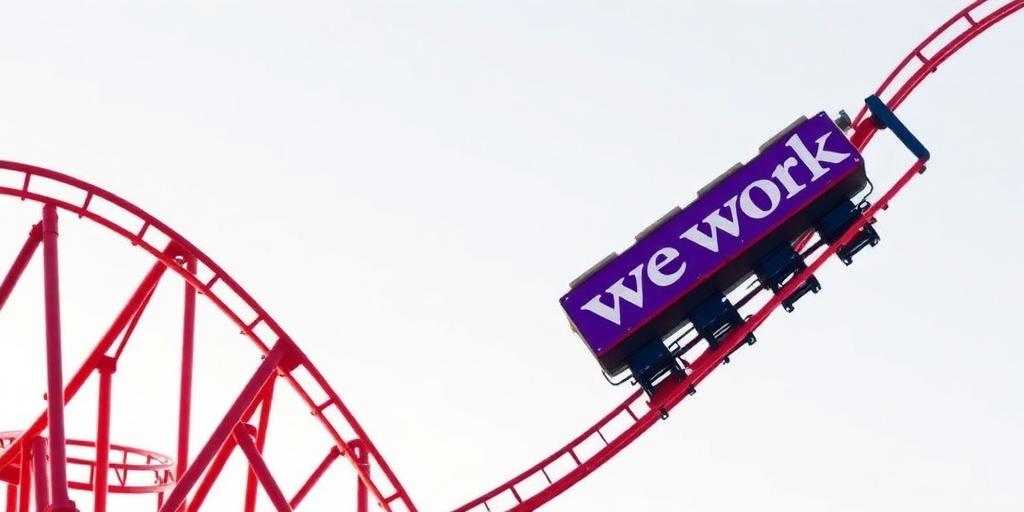WeWork's Valuation Rollercoaster: A Modern Case Study in Narrative Economics and Hype
WeWork's story is more than just a business saga; it's a compelling case study in narrative economics, hype, and the perils of misaligned valuations. From its meteoric rise to its dramatic fall, the company's trajectory offers valuable lessons for investors, entrepreneurs, and anyone interested in the dynamics of modern markets.
The Allure of the WeWork Narrative
Founded in 2010, WeWork presented itself as a revolutionary force, transforming the traditional office space into a vibrant, community-driven ecosystem. Co-founder Adam Neumann masterfully crafted a narrative around 'community,' 'energy,' and 'a new way of working.' This resonated deeply in a world increasingly seeking connection and purpose, especially among millennials and the burgeoning startup scene. The company wasn't just selling office space; it was selling a lifestyle, an identity, and a promise of belonging.
The Soaring Valuation
Fueled by this compelling narrative, WeWork's valuation soared. Investors, captivated by the vision of a tech-driven real estate disruptor, poured billions into the company. At its peak, WeWork was valued at a staggering $47 billion, making it one of the most valuable startups in the world. This valuation was predicated on the idea that WeWork was more than just a real estate company; it was a tech company with recurring revenue, scalable operations, and a massive addressable market.
Cracks in the Facade
However, as WeWork prepared for its initial public offering (IPO) in 2019, cracks began to appear in the façade. Scrutiny of the company's financials revealed a stark reality: WeWork was bleeding money at an alarming rate. Its business model, based on leasing properties and then subletting them to members, was heavily reliant on long-term lease obligations and short-term membership agreements. This mismatch created significant financial risk, especially in the event of an economic downturn.
Furthermore, concerns arose about Adam Neumann's leadership and corporate governance. His eccentric behavior, self-dealing transactions, and unconventional management style raised red flags among investors and analysts. The IPO prospectus exposed a company with serious financial and operational challenges, masked by a charismatic leader and a compelling, yet ultimately unsustainable, narrative.
The Valuation Reset
The IPO was ultimately withdrawn, and WeWork's valuation plummeted. SoftBank, the company's largest investor, stepped in with a rescue package, but the damage was done. Adam Neumann was ousted, and WeWork underwent a major restructuring. The company's valuation was slashed to less than $8 billion, a stark reminder of the dangers of hype and the importance of fundamental analysis.
Lessons Learned
WeWork's story offers several key lessons:
- Narrative Matters, but Fundamentals are Crucial: A compelling story can attract investors and drive growth, but it cannot replace a sound business model and strong financials.
- Valuation Should Reflect Reality: Valuations based on hype and speculation are ultimately unsustainable. Investors must carefully assess a company's underlying fundamentals and long-term prospects.
- Governance is Essential: Strong corporate governance and ethical leadership are critical for long-term success. Investors should be wary of companies with questionable leadership or weak governance structures.
- Due Diligence is Paramount: Thorough due diligence is essential before investing in any company, especially high-growth startups. Investors must carefully examine a company's financials, operations, and competitive landscape.
WeWork Today
Today, WeWork operates under new leadership and a restructured business model. The company went public via SPAC in 2021, but its valuation remains far below its peak. WeWork's future remains uncertain, but its story serves as a cautionary tale about the importance of balancing vision with reality, hype with fundamentals, and narrative with economics. The company's journey underscores the critical need for investors to look beyond the surface and conduct thorough analysis before making investment decisions. It's a modern case study that will be analyzed and debated for years to come, providing valuable insights into the dynamics of narrative economics and the forces that shape market valuations.









